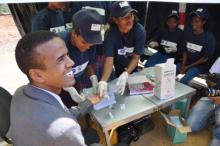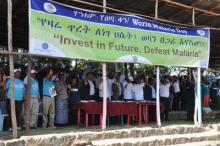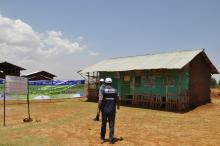Small Bite, Big Threat
Ethiopia Intensifies Action against Vector-Borne Diseases.
ore than half the world’s population is at risk of vector-borne diseases such as dengue, malaria, yellow fever, schistosomiasis, leishmaniasis and lymphatic filariasis, carried by mosquitoes, flies, ticks, water snails and other vectors. Every year, more than one billion people are infected and more than one million die from these diseases.
Vector-borne diseases affect most severely the poorest populations, particularly where there is a lack of access to adequate housing, safe drinking water and sanitation. Although many challenges remain, significant progress has been made in the African Region to tackle vector-borne diseases. For example, between 2001 and 2012 an estimated 337 million cases of malaria were averted, and a good percentage of this figure is due to the progress made in Ethiopia.
The progress in Ethiopia, and worldwide, comes following a massive increase in the use of mosquito nets, the expansion of programmes to spray the insides of buildings with insecticides, and improvements in the rapid detection and treatment of cases. Preventive and case management interventions, rapid response to outbreaks to avoid epidemics and the deployment of health extension workers (HEWs) to provide community-based preventive, promotive and curative health services have contributed to significant gains in malaria control in the country.
In Amhara region, Dera woreda, Wonchit kebele health post is an example of best practice in malaria control. 1610 bed nets are being used in the kebele consisting of 1883 households and 93% of the nets are insecticide treated. The health extension worker in the kebele is experienced in treating malaria, and the community is also well trained in detecting the early signs of malaria, as well as the ways to prevent it. These factors have contributed to the reduction of malaria cases in the community.
In 2014, the World Health Day, on 7 April, highlighted the joint responsibility of governments, communities and families to take action to effectively respond to the threat of vector-borne diseases under the theme . Later the same month, on 25 April, World Malaria Day drew attention to the need for continued investment and sustained political commitment for malaria control and elimination under theme.
For more information, please contact: Dr Worku Bekele, Malaria Prevention and Control Programme Coordinator, WHO Ethiopia; email: workub [at] who.int
PHOTOS: WHO Ethiopia/ Viivi Erkkila









